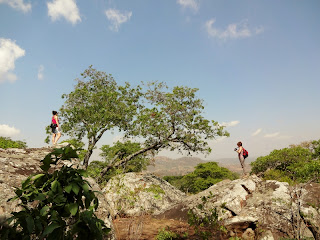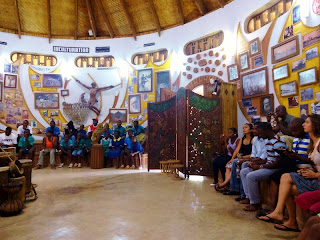A few hours outside Lilongwe is Dedza, a city that located on the Dedza Plateau at the highest elevation of any city in Malawi.
It is host to three activities of interest; the Dedza pottery workshop, store, and coffee shop; the Kungoni Center of Culture and Art at Mua Mission; and the UNESCO World Heritage Site of Chongoni Rock Art.
.jpg) Dedza pottery offers a variety of beautiful pottery items, including basic mugs, bowls, and plates, as well as other items, such as salt and pepper shakers, Dutch ovens, flower vases, and even ceramic tiles that are made-to-order for the home. (For more information on the pottery and the business, see here.) In addition, the coffee shop is famous (at least in Malawi) for its delicious cheesecake. Some people claim the cheesecake itself is worth the drive from Lilongwe....
Dedza pottery offers a variety of beautiful pottery items, including basic mugs, bowls, and plates, as well as other items, such as salt and pepper shakers, Dutch ovens, flower vases, and even ceramic tiles that are made-to-order for the home. (For more information on the pottery and the business, see here.) In addition, the coffee shop is famous (at least in Malawi) for its delicious cheesecake. Some people claim the cheesecake itself is worth the drive from Lilongwe....For a different cultural experience, visit the Kungoni Center at Mua Mission to learn about Malawi's pre-colonial history. Not only is this one of the few places that still preserves some original old growth trees in a country suffering from extreme deforestation, but the Center has a museum and offers tours to both visitors and locals. Our group shared a museum tour with a group of Malawian teenagers from Lilongwe would had come to learn about their cultural heritage; an opportunity that simply doesn't exist in the young, urban capital.
And for those who enjoy some nature with their cultural history, be sure not to miss a hike in the Chongoni Mountains to view the famous Chongoni Rock Art sites. There are 127 sites in total, but they are spread out throughout the hills, so you can only view a handful in one day. It is best to use a tour operator for this excursion. Some friends tried to find the paintings on their own and ended up wandering around in the hills for hours with no luck because paths don't exist up there. Even our tour guide picked up two local chiefs on our trip to help guide us to the first site because it is so hard to find.
The paintings are divided into 2 groups; white paintings made by pygmy hunter-gatherers that date from as early as the 1st millennium AD and red paintings made by the Chewa people (the main ethnic group in the country) who moved into the area and displaced the original artists beginning in the 15th century. Interestingly, the newcomers didn't erase the original white paintings, instead painting around and over them.
This evident respect for history and culture is sadly juxtaposed by the disrespect local people have shown for the sites that aren't actively protected by the government. In areas where there has not been a concerted effort to educate the locals about the importance of these sites, people have scratched out, written over, or simply removed chunks of the rocks where paintings were, not to mention leaving trash and burning leaves against the walls.
We were really pleased with the tour company we chose: Small Steps Adventure Tours. The tour cost $70USD per person and we were picked up in Lilongwe at 7am for a full day of driving and hiking. Our guide, Franciwell, was a sweetheart and knew the area like the back of his hand, including the locals.
 To contact this company, try any of these:
To contact this company, try any of these:www.smallstepsadventuretours.com
info@smallstepsadventuretours.com
(+265) 999-773-395/ 888-873-783
.jpg)


















.jpg)

.jpg)